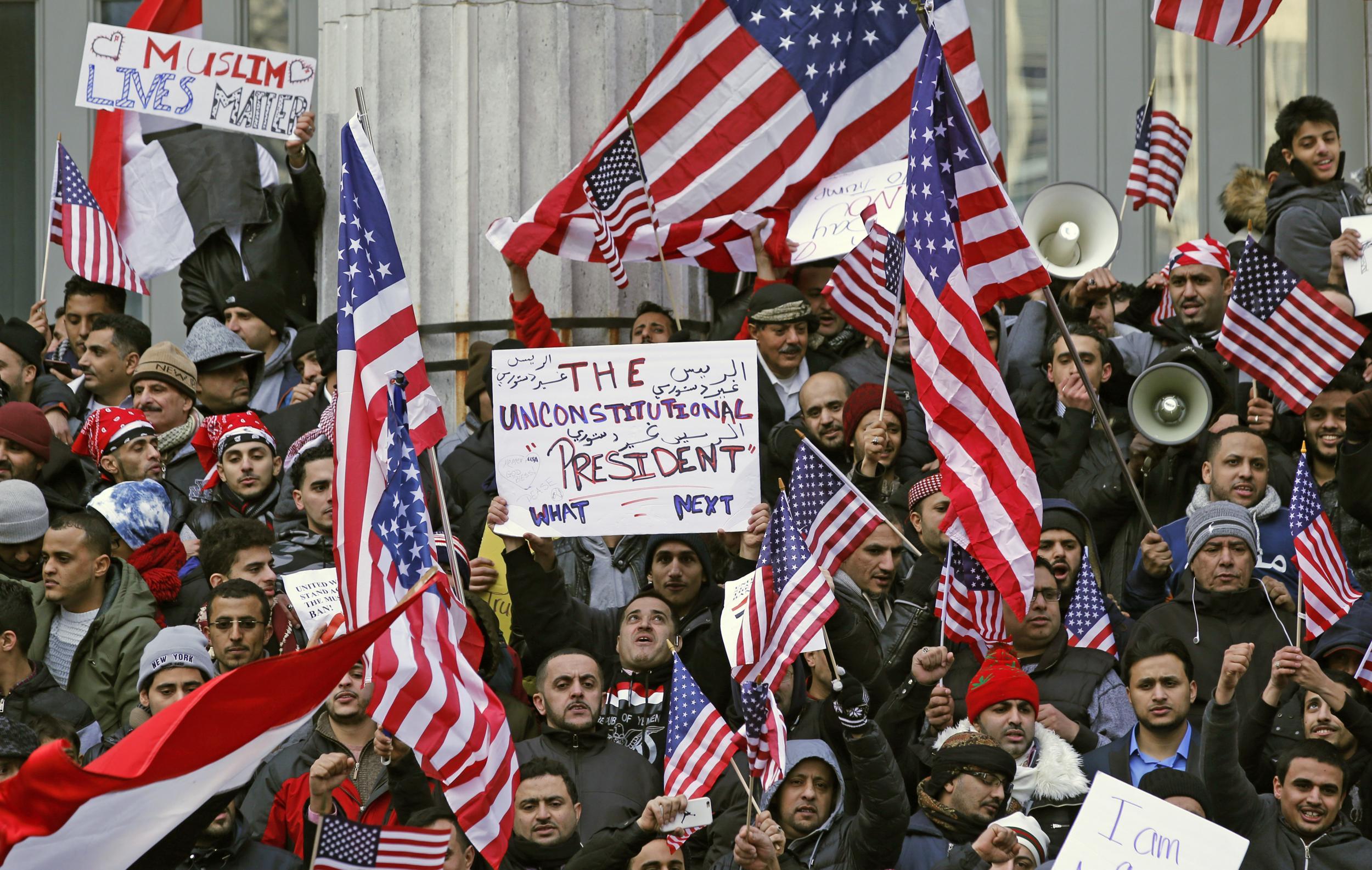Department of Homeland Security suspends Muslim ban following judge order
Revoked visas are being handed back to immigrants and airlines have resumed normal operations

Your support helps us to tell the story
From reproductive rights to climate change to Big Tech, The Independent is on the ground when the story is developing. Whether it's investigating the financials of Elon Musk's pro-Trump PAC or producing our latest documentary, 'The A Word', which shines a light on the American women fighting for reproductive rights, we know how important it is to parse out the facts from the messaging.
At such a critical moment in US history, we need reporters on the ground. Your donation allows us to keep sending journalists to speak to both sides of the story.
The Independent is trusted by Americans across the entire political spectrum. And unlike many other quality news outlets, we choose not to lock Americans out of our reporting and analysis with paywalls. We believe quality journalism should be available to everyone, paid for by those who can afford it.
Your support makes all the difference.The Department of Homeland Security has suspended all enforcement of the immigration ban signed into effect by President Donald Trump.
Immigrants will be once more be allowed into the US from the seven countries affected by the executive order last month: Syria, Iraq, Iran, Libya, Yemen, Sudan and Somalia.
The move follows a nationwide locking of the executive order from federal judge James Robart in Washington – a move that has plunged the new administration into a crisis that has challenged Mr Trump’s authority, and ability to fulfil his promises.
The 60,000 or so visas that had been revoked will be handed back to their holders, the State Department announced.
A caveat applies to those whose visas had been physically stamped or taken away – they will have to reapply.
The dramatic move to suspend the enforcement of the ban comes just eight days after the executive order was signed by the President, which immediately instructed agencies and airports across the US to no longer allow nearly all travellers from the seven countries into the US.
The order prompted confusion for those travelling, massive protests around the country and at least four states and three large civil rights organisations filed lawsuits.
In Michigan, for example, a judge clarified the order to make sure the ban did not affect law-abiding, permanent residents of the US.
But it was in Seattle, Washington, that a lawsuit filed by state attorney general Bob Ferguson brought about a nationwide suspension of the ban.
Judge Robart ruled in favour of Mr Ferguson. “No one is above the law,” said Mr Ferguson. “Not even the President.”
It is not a done deal, however – the case could go all the way to the Supreme Court before a final decision is made. The White House is working to reinstate the ban and the Justice Department is expected to ask the 9th Circuit Court of Appeals to set aside Judge Robert’s ruling so the ban could go back into effect.
But Mr Trump made clear his thoughts on the ruling, calling the order from the “so-called” judge “ridiculous”.
“The opinion of this so-called judge, which essentially takes law-enforcement away from our country, is ridiculous and will be overturned,” Mr Trump tweeted. “When a country is no longer able to say who can and who cannot come in & out, especially for reasons of safety & security – big trouble!”
Mr Robart was sworn in with almost unanimous consent from the Senate under George W Bush.
That rhetoric could put government lawyers defending Mr Trump’s order in a difficult position if a federal appeals court were to ask them about it.
“Either they have to defend the statements that Judge Robart is a ‘so-called judge’, which you can’t do, or they have to distance themselves from the President, who is their boss,” University of Pittsburgh law professor Arthur Hellman told the Associated Press.
With legal challenges pending, two prominent Middle Eastern air carriers announced they would resume carrying passengers from the seven affected countries. Qatar Airways and Etihad Airways, national carrier of the United Arab Emirates, said US-bound travellers from those countries with valid visas would be allowed to board.
In Egypt, Cairo airport and airline officials said they have received instructions from the US Customs and Border Protection to suspend President Trump’s executive order.
Government-backed Qatar Airways is one of a few Middle East airlines operating direct daily flights to multiple American cities. Its US destinations from its Doha hub include New York, Chicago, Los Angeles, Miami and Washington.
White House Press Secretary Sean Spicer quickly released a statement on Friday evening to say the Justice Department would enforce the emergency stay of the executive order “at the earliest time possible”.
He called the judge ruling “outrageous” but then, minutes later, edited out the word from the statement and said the government would adhere to the court’s ruling until the Justice Department intervenes.
Mr Ferguson has in the past also filed lawsuits against former President Barack Obama, and insisted his lawsuit was not a partisan issue.
“We are a nation of laws,” he told CNN on Friday evening.
The executive order had sought to indefinitely suspend Syrian refugees, ban all travellers from the seven countries for 90 days and refugees for 120 days.
It also wanted to develop a “uniform screening procedure” for all immigrants from around the world, prompting legal experts to threaten this wording, if interpreted literally, could shut down all immigration and tourism.
Clarity on dual nationals was only given on Friday – the ban did not apply to them – and the ban caused chaos and confusion in Mexico and Canada.
Subscribe to Independent Premium to bookmark this article
Want to bookmark your favourite articles and stories to read or reference later? Start your Independent Premium subscription today.
Join our commenting forum
Join thought-provoking conversations, follow other Independent readers and see their replies
Comments